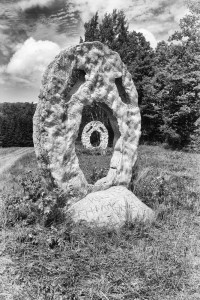When Up is Down (Part 9)
By Asher Crispe: June 22, 2015: Category Thought Figures
Kabbalistic Reflections on T.S. Eliot’s Four Quartets
My words echo
Thus, in your mind.
T.S. Eliot Burnt Norton I
 When the intersubjective connection, accomplished when amphibious speech swims the distance from person to person and then penetrates the mental landscape of the recipient, restlessly ricochets off the surfaces of thought and memory before fragmenting, with some seeping in, just as a wisp here and a flake there gets rerouted, misplaced, lost, we come to perceive Eliot’s evocative echo. Perhaps the echo is but a facsimile of our lived time? An alternative time line that only diverges ever so slightly from the one we realized, running in parallel and brought to our attention by the dissective reflection of the poet’s authority?
When the intersubjective connection, accomplished when amphibious speech swims the distance from person to person and then penetrates the mental landscape of the recipient, restlessly ricochets off the surfaces of thought and memory before fragmenting, with some seeping in, just as a wisp here and a flake there gets rerouted, misplaced, lost, we come to perceive Eliot’s evocative echo. Perhaps the echo is but a facsimile of our lived time? An alternative time line that only diverges ever so slightly from the one we realized, running in parallel and brought to our attention by the dissective reflection of the poet’s authority?
Were my words granted unimpeded passage to your mind, were they welcomed without hesitation, guided to a clearly demarcated dock, then there would be no need for echoes. Sound must meet with an obstacle, an impervious substance, in order to reverberate. But echoes are also a ghosting of the formative sound. Not heard in ‘real’ time, they depute an absence on behalf of an original presence. They are surrogates. Exchanges of words are already replacements for the experiences and things they designate and the ledger that preserves the record of these exchanges for posterity forms the fodder for more complex memories–the ones laden with the concern for “what might have been and what has been” in Eliot’s idiom.
The echo is chimerical.
Rummaging through the textual tapestry of Jewish sources and we come across a curious verse in Deuteronomy/Devarim (5:19) where the character of Divine self-expression is recorded as being “a great voice and without cessation.” Some add that this uninterrupted voice means that it continues to this day, while others put forth the view that it is never repeated, in the sense that there was no echo when it was initially heard. These two assertions emphasize the limitless nature of the Divine ‘voice’ both in terms of time and space. A voice that carries on and continues to be heard over millennia, unlike a sound that drops off and gets fainter over time, expresses its enduring relevance to all times. So too, the lack of an echo has been noted as a kind of unbounded spatial dissemination (see Raayonos Leparshios Hashovua from Likkutei Sichos Vol. 4 pp.74-79). The ‘greatness’ (gadol) of this voice rests precisely in its uninhibited ability to grow (gadal) in our consciousness till it encompasses the entire space-time continuum.
Hearing the one voice (unity) rather than the echo (disunity) is also akin to acquiring one’s information from a direct source, a permanent presence, rather than from an indirect second-hand one, that of a diminished reflection or re/presentative copy. Adjusting our ears after considering the Torah’s perspicacity permits a novel reading of Eliot’s evocation of the echo. In a world surrendered to temporal decay, to the pruning of possibility, to lost chances and untrodden paths, our mental facilities have erected walls of recorded knowledge–the barriers that recall the real with indifference to desire–which cause the reflections of the words, their echo, in our mind.
How appropriate that an echo may be referred to as a bat kol in Hebrew. Literally, we are speaking of a ‘daughter’s voice,’ a child’s mirroring of the original utterance. Cast in the feminine on account of the Kabbalah’s appropriation of the feminine as a symbol of remediation, a vessel or vehicle for augmenting the reality of what is deposited within it, the smallness of the daughter (who is not ready to be a mother yet, for in that case, the fully matured remediator would produce something greater than the original) scales down both qualitatively and quantitatively the original. We only get an allusive impression of it.
Up until this point in the poem Eliot was speaking as a ‘we.’ Who was the other who anonymously joins him in his musing “down the passage which we did not take, towards the door we never opened’? A lost love? God? Anyone? Everyone? His human speech cannot be expected to pass into the mind of the other without resistance. The private subjectivity of the other is the repellent to his words. Perhaps some of what he imagines is absorbed but much bounces back. The remnant of the ‘we’ splits into ‘you’ and ‘me.’ Trailing along, the ‘we’ cannot be full contemporary to the ‘I’ who goes out to comment on his own. ‘We’ can only be posed hypothetically. Only the Divine voice pierces everything, including the ‘we,’ uniformly and without an echo. Could it be that this is what we are seeking along with Eliot in reading his poem–the lost Divine voice that rejoins the ‘we’ and heals the rifts in time and the fissures in space?
What then might be lurking in another Hebrew equivalent of an echo? Heid (הד) shares an affinity with the word hod (הוד) ‘splendor,’ a resplendent shining light or hodayah ‘acknowledgement, thanksgiving and praise’ or hoda’ah ‘confession or admission.’ In the most basic of terms, I acknowledge what has happened to me, what I have been given, with thanks; I shine a reflective light; I echo my gifts by giving back. Calling to mind an often cited declaration that appears both in early Kabbalah (Zoharic literature) and Lurianic teachings from the 16th century (where the idea receives a refined formulation [see Etz Chaim Sha’ar 29, Chapter 8]), that understanding [binah] extends until acknowledgment [hod], we can reassess our echo in question in as much as the ultimate extension of our understanding meets with an acknowledging (hod) echo (heid).
First of all, what do we mean by ‘understanding?’ Binah, in the Hebrew, can be equated with our ‘constructed’ reality (boneh, ‘to build’ is an etymological kinsmen of binah) that forms our representational thinking about how things were or are or will be. Bein, another sapling growing from this same root, informs us that the conceptual models manufactured in the mind are all relative. Springing from how I conceptualize myself, my faculty of memory (moach hazicharon of chochmah, past inspired ‘insight’) is rattling around the in the cage of my mind (binah) and it echoes–the memories jostle my mind, which is to say, they the bump up against this inner structuring of consciousness or mental matrix (binah is also termed imma or ‘mother’ in Kabbalah–that is, mother as womb, the site of our ‘reproduction’ of reality).
 As our inner self-representations overflow into the emotive realm, we come to feel our states of consciousness. When a particular expression flows through its emotive stages (5 in all in the kabbalistic depiction), it reaches or extends until an end and this is an acknowledgment, a felt realization. Reaching the limits of a single understanding, I arrive at a wall that the experience bounces off, a reflected light, an echo; this echo signals that something didn’t penetrate. It marks a frontier. We might even broadcast it is as a ‘circumfession’ (a roundabout confession) and opens me to that which transcends the intellect, to what could be otherwise, the unthought and inconceivable, to the hypothetical or counterfactual.
As our inner self-representations overflow into the emotive realm, we come to feel our states of consciousness. When a particular expression flows through its emotive stages (5 in all in the kabbalistic depiction), it reaches or extends until an end and this is an acknowledgment, a felt realization. Reaching the limits of a single understanding, I arrive at a wall that the experience bounces off, a reflected light, an echo; this echo signals that something didn’t penetrate. It marks a frontier. We might even broadcast it is as a ‘circumfession’ (a roundabout confession) and opens me to that which transcends the intellect, to what could be otherwise, the unthought and inconceivable, to the hypothetical or counterfactual.
Certainly, an astute reader will smell the confessional element in Eliot’s poem. On overcast days, one is tempted to read it as an admission of guilt for not having done more or done differently. A failure to thrive. On the other hand, it does not accomplish this directly with an emotional live wire. The philosophic abstraction and compactified language stretch our minds to the limit as we wrestle with what is beyond consciousness, what time will tell and not tell. Awkward stitching aside, we can follow the thought threads of the not fully communicable, confessional, over sighted acknowledgment of the otherwise, the brush with temporal alterity that drives a wedge between the voice and its echo, as we find ourselves staring at the rose-garden.
Next, we will turn our attention to the figure of the bird in poem as the subject of Part Ten.
We wish to dedicate this series of articles to the memory and elevation of the soul of Yaakov Ben Tzvi Hersh (Ballan) whose soul should experience the reality where ‘time present and time past’ are both definitely ‘present in time future…May his soul be bound in the bundle of life. –The 5th of Tamuz 5772.
When Up is Down (Part 9),












;)
;)
;)
;)
;)
;)
;)
;)
;)
;)
